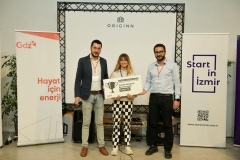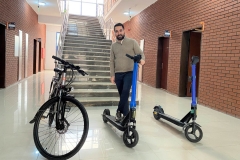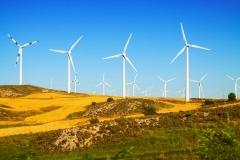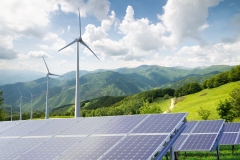
GRADUATE SCHOOL
Sustainable Energy (Without Thesis)
SEN 554 | Course Introduction and Application Information
| Course Name |
Energy Transportation and Logistics Management
|
|
Code
|
Semester
|
Theory
(hour/week) |
Application/Lab
(hour/week) |
Local Credits
|
ECTS
|
|
SEN 554
|
Fall/Spring
|
3
|
0
|
3
|
7.5
|
| Prerequisites |
None
|
|||||
| Course Language |
English
|
|||||
| Course Type |
Elective
|
|||||
| Course Level |
Second Cycle
|
|||||
| Mode of Delivery | - | |||||
| Teaching Methods and Techniques of the Course | - | |||||
| Course Coordinator | ||||||
| Course Lecturer(s) | ||||||
| Assistant(s) | ||||||
| Course Objectives | The aim of the course is to examine the essential technology, processes and policies related to energy distribution. Different energy resources will be analyzed and transportation of energy sources according to usage area will be examined. The energy distribution issue will be evaluated from logistics management perspective. The problems that are faced in energy distribution and the solutions for these are also included in the content of the course. Students will gain better understanding of the transportation of energy in general. |
| Learning Outcomes |
The students who succeeded in this course;
|
| Course Description | This advanced course is designed to analyze energy transportation and logistic management from innovative perspective |
|
|
Core Courses | |
| Major Area Courses | ||
| Supportive Courses | ||
| Media and Management Skills Courses | ||
| Transferable Skill Courses |
WEEKLY SUBJECTS AND RELATED PREPARATION STUDIES
| Week | Subjects | Related Preparation |
| 1 | Logistics and Supply Chain Management | No Assigned Readings |
| 2 | Energy Overview | “Energy Management Handbook” by Turner and Doty, CRC pres, 6th Edition, (2006), ISBN: 0881735426. |
| 3 | Energy Supply Chain – I | “Energy Management Handbook” by Turner and Doty, CRC pres, 6th Edition, (2006), ISBN: 0881735426. |
| 4 | Energy Supply Chain – II | “Energy Management Handbook” by Turner and Doty, CRC pres, 6th Edition, (2006), ISBN: 0881735426. |
| 5 | Traditional Supply Chains and Energy Supply Chains – Similarities and Differences | “Energy Management Handbook” by Turner and Doty, CRC pres, 6th Edition, (2006), ISBN: 0881735426. |
| 6 | Transportation and Transmission of Energy by Type | “Energy Management Handbook” by Turner and Doty, CRC pres, 6th Edition, (2006), ISBN: 0881735426. |
| 7 | Energy Transportation by Modes and Intermodal Transportation of Energy | “Energy Management Handbook” by Turner and Doty, CRC pres, 6th Edition, (2006), ISBN: 0881735426. |
| 8 | Energy Storage Overview | “Energy Management Handbook” by Turner and Doty, CRC pres, 6th Edition, (2006), ISBN: 0881735426. |
| 9 | A Comparative Perspective on Energy Storage Technologies | “Energy Management Handbook” by Turner and Doty, CRC pres, 6th Edition, (2006), ISBN: 0881735426. |
| 10 | E-Mobility and Logistics | “Energy Management Handbook” by Turner and Doty, CRC pres, 6th Edition, (2006), ISBN: 0881735426. |
| 11 | E-Mobility Logistics - Opportunities and Challenges | “Energy Management Handbook” by Turner and Doty, CRC pres, 6th Edition, (2006), ISBN: 0881735426. |
| 12 | Smart Energy Systems | “Energy Management Handbook” by Turner and Doty, CRC pres, 6th Edition, (2006), ISBN: 0881735426. |
| 13 | Logistics of Smart Energy Systems | “Energy Management Handbook” by Turner and Doty, CRC pres, 6th Edition, (2006), ISBN: 0881735426. |
| 14 | Contemporary Issues in Energy Transportation and Logistics | “Energy Management Handbook” by Turner and Doty, CRC pres, 6th Edition, (2006), ISBN: 0881735426. |
| 15 | Review of the Semester | “Energy Management Handbook” by Turner and Doty, CRC pres, 6th Edition, (2006), ISBN: 0881735426. |
| 16 | Final Exam |
| Course Notes/Textbooks | Lecture notes based on the above subjects and related presentation material |
| Suggested Readings/Materials | “Energy Management Handbook” by Turner and Doty, CRC pres, 6th Edition, (2006), ISBN: 0881735426; “Sustainable Energy Choosing Among Options” by Tester, Drake, Driscoll, Golay, Peters. MIT Press, (2005), ISBN:0262201534; Energy, its Use and the Environment, 4th Edition, Hinrichs & Kleinbach, Thompson Biiks/Cole,2006; Out of Gas: The End of the Age of Oil, Norton, NY, 2004; Hubbert’s Peak: The Impending World Oil Shortage, Princeton, Princeton NJ,2001; Donald Janelle and Michel Beuthe, “Globalization and Research Issues in Transportation”, Journal of Transport Geography, Vol 5, No 3 (September 1997), 199206 (Online Science Direct); David Greene. "Transportation and Energy". Transportation Quarterly Vol.48, No.1 (Winter, 1994), pp. 91101. |
EVALUATION SYSTEM
| Semester Activities | Number | Weigthing |
| Participation |
1
|
10
|
| Laboratory / Application | ||
| Field Work | ||
| Quizzes / Studio Critiques | ||
| Portfolio | ||
| Homework / Assignments | ||
| Presentation / Jury |
1
|
20
|
| Project |
1
|
30
|
| Seminar / Workshop | ||
| Oral Exams | ||
| Midterm | ||
| Final Exam |
1
|
40
|
| Total |
| Weighting of Semester Activities on the Final Grade |
3
|
60
|
| Weighting of End-of-Semester Activities on the Final Grade |
1
|
40
|
| Total |
ECTS / WORKLOAD TABLE
| Semester Activities | Number | Duration (Hours) | Workload |
|---|---|---|---|
| Theoretical Course Hours (Including exam week: 16 x total hours) |
16
|
3
|
48
|
| Laboratory / Application Hours (Including exam week: '.16.' x total hours) |
16
|
0
|
|
| Study Hours Out of Class |
15
|
4
|
60
|
| Field Work |
0
|
||
| Quizzes / Studio Critiques |
0
|
||
| Portfolio |
0
|
||
| Homework / Assignments |
0
|
||
| Presentation / Jury |
1
|
27
|
27
|
| Project |
1
|
40
|
40
|
| Seminar / Workshop |
0
|
||
| Oral Exam |
0
|
||
| Midterms |
0
|
||
| Final Exam |
1
|
50
|
50
|
| Total |
225
|
COURSE LEARNING OUTCOMES AND PROGRAM QUALIFICATIONS RELATIONSHIP
|
#
|
Program Competencies/Outcomes |
* Contribution Level
|
||||
|
1
|
2
|
3
|
4
|
5
|
||
| 1 | To improve theoretical and conceptual proficiencies as well as applied competencies on energy studies. | |||||
| 2 | To evaluate the problems and circumstances about energy systems by using theoretical and practical knowledge in fundamental disciplines of energy studies such as economics, natural sciences, political science, law, and sociology. | |||||
| 3 | To analyze multi-dimensional problems which are faced and unpredicted in energy system by taking over responsibility as an individual and a group member. | |||||
| 4 | To evaluate the relationships between factors in energy policies and applications such as structures, markets, institutions, regulations, climate change and environment in a critical perspective. | |||||
| 5 | To debate problems in sustainable energy development by identifying them. | |||||
| 6 | To argue positive and negative aspects of international affairs and geopolitics on energy. | |||||
| 7 | To examine the economic and political structure that energy systems are based on. | |||||
| 8 | To question the theoretical and empirical gaps in energy studies literature by developing original arguments in order to fill these gaps in the literature. | |||||
| 9 | To interpret the collected data that would measure the theories, scenarios and concepts as variables by using scientific research methods in energy sciences and sustainable energy development field. | |||||
| 10 | To prepare an original thesis/term project about political, economic, environmental, social and/or historical dimensions of sustainable energy and geopolitics in accordance with scientific criteria. | |||||
| 11 | To develop foreign language skills to be able to follow the literature on energy studies and to communicate with international scholars. | |||||
| 12 | To be able to use data and information in advanced levels in the field of energy sciences. | |||||
| 13 | To have ethical, social and scientific values in the stages throughout the processes of collecting, interpreting, disseminating and implementing data relevant to energy studies. | |||||
*1 Lowest, 2 Low, 3 Average, 4 High, 5 Highest
NEWS |ALL NEWS

‘Double award’ for energy efficiency
Izmir University of Economics (IUE) received a double award at the ‘Innovative Idea Development Workshop in the Electricity Distribution Sector’ organized with

International investment for ‘Scootable’
Emrecan Durmaz, a student of Izmir University of Economics (IUE), who developed the software infrastructure that enables electric scooters and bicycles to

‘Social' analysis of energy’
Prof. Dr. Mehmet Efe Biresselioğlu from Izmir University of Economics (IUE) has implemented the ‘Cure’ project with 2 countries to measure the

